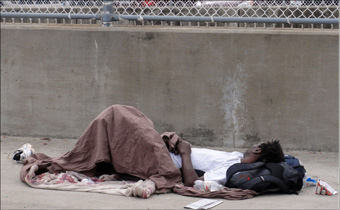By Saeed Shabazz-Staff Writer-

Almost half of America’s Black children live in segregated neighborhoods with concentrated poverty, while only 12 percent of poor White children live in similar neighborhoods, according to the Washington, D.C.-based Economic Policy Institute.
Two years ago a Brookings Institute report showed 20.5 million Americans, or 6.7 percent of the U.S. population, is categorized as the “poorest of the poor.”
“Those living in deep poverty represent nearly half of the 46.2 million people below the poverty line,” the report noted.
In 2010, the poorest of the poor meant an income of $5,570 or less for an individual and $11,157 for a family of four–that 6.7 percent share is the “biggest in the 35 years that the U.S. Census Bureau has maintained such records,” according to the Brookings Institute.
“Recent research suggests that reducing children’s exposure to concentrated poverty can improve the likelihood of upward economic mobility,” wrote Algernon Austin, director of the Program on Race, Ethnicity and the Economy at the Economic Policy Institute.
The EPI report, which came out in July, also found concentrated poverty for Blacks in America had not changed since the 1963 March on Washington.
“The historical issue of Black poverty remains the same as it was over one hundred years ago in 1913 due to a system of Jewish economic racism and control of majority lending institutions in America,” said Lamarr Brown, CEO and founder of the Maryland-based think tank Organization of African American Concerns in an e-mail to The Final Call.
Economic racism is a tool of capitalism, which thrives only when you have lower wage workers, which is the situation in most Black neighborhoods, Mr. Brown said. “The new trend is to employ African Americans in part-time jobs, however, they must jockey for these jobs against the new immigrant workers from Eastern Europe and Asia,” he said.
“Unlike 50 years ago, the system of White supremacy has disguised itself so effectively that grassroots people don’t recognize the enemy,” said Dr. Raymond Winbush, Ph.D., of the Institute for Urban Research at Morgan State University.
Dr. Winbush told The Final Call in an e-mail the condition of Blacks is worsening due to a lack of knowledge of the new tools of racism and White supremacy. “The old ‘colored only’ signs have disappeared, replaced by far more insidious ‘mini-systems’ of ‘pay day’ loans, and the takeover of our traditional businesses such as hair care products by people who live outside of our communities,” he said.
Dr. Winbush argues that to combat modern-day oppression new strategies are needed. “Some of our leaders have opted for marching which is important, but in the end, only symbolic; and it leaves the system of our oppression relatively intact,” he said.
Community Voices Heard is a New York-based organization composed mostly of women on welfare. They are working to give women a stronger voice in the debate about poverty and why work isn’t raising them out of poverty. “We have begun a series of weekly gatherings known as poverty meetings to listen to the concerns of people and to come up with solutions,” Denise Bonitto, a CVH member leader explained to The Final Call.
“Many of our members are grandmothers like myself, and what we fear is that for our grandchildren there is no tomorrow,” said Ms. Bonitto.
It isn’t difficult to believe little has improved over the past 50 years because that reality stares us in the face every day, she added.
Philadelphia has a population of 1.5 million people and 44.3 percent of the population is Black. Just over 26 percent of Philadelphians live below the poverty level.
Music icon Kenny Gamble and his wife Faatimah created Universal Companies. They have opened 5 charter schools and built affordable housing. The mix, they say, is intentional. “The solution is education,” Mr. Gamble said. The city closed 30 schools but new prisons are under construction, he noted. “Unity, pulling together our resources–the solution is ‘doing for self’–it takes sacrifice,” Mr. Gamble said.
Professor Patrick Sharkey, Ph.D., associate professor of Sociology at New York University in his new book “Stuck in Place: Urban Neighborhoods and the End of Progress Toward Racial Equality” argues what is needed is “a redistribution, a change in the way that we currently invest resources in disadvantaged communities.”
Dr. Molefi Kete Asante, Ph.D., of the Dept. of African American Studies at Temple University and an advocate of Afrocentric education, said the structural system of racism has remained the same over the past 50 years. “We have the solution in our hands which is unity,” he said. Blacks talk a good game about being united, but are still very much divided, he added.
“There is nothing tying us together except the poverty,” Dr. Asante said. He is calling for a strong Pan Africanist, Black Nationalist movement.
“We have to start teaching our young children all over again about the meaning of self-determination,” Dr. Asante said.












